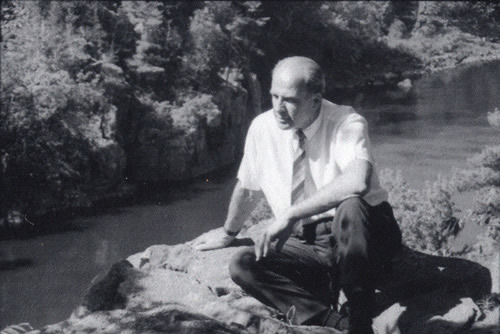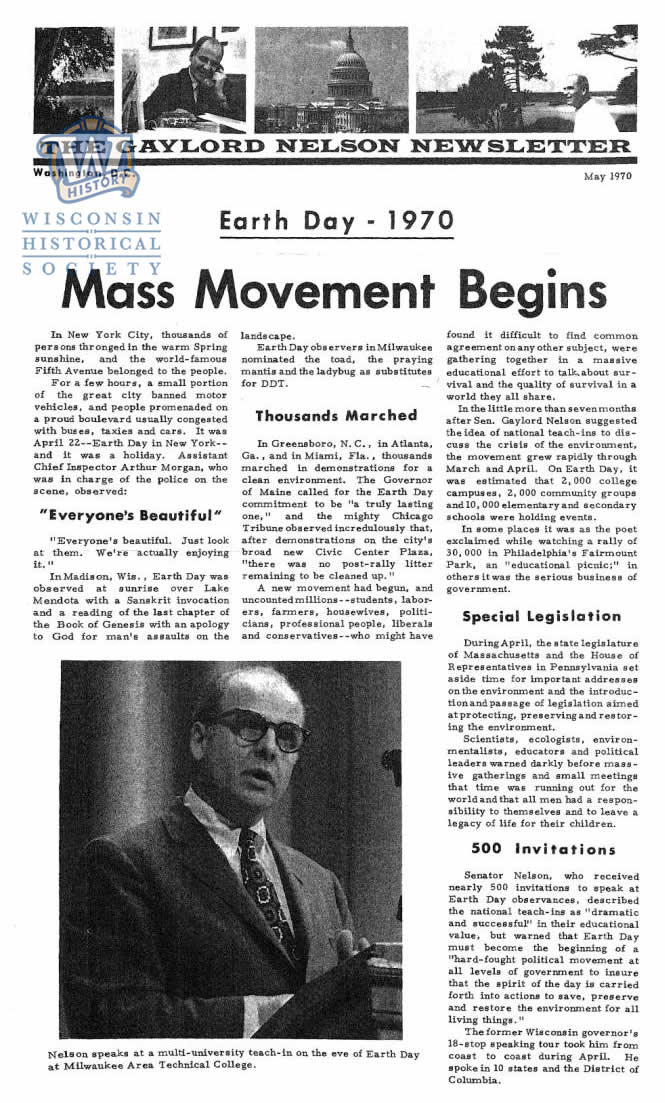The inception of Earth Day is a testament to the vision of one man and the growing public concern for the environment. In 1969, Wisconsin Senator Gaylord Nelson proposed a national teach-in on urgent ecological issues. His hope was that it would let legislators know how important ecological issues were to every American.
Sen. Nelson’s idea was to have the event organized by individuals and groups in their own communities, not by organizers in Washington. He felt localized, grassroots action would be more powerful and effective, both to raise awareness and put pressure on politicians to act on environmental legislation.
 His hope: “If we could tap into the environmental concerns of the general public and infuse the student anti-war energy into the environmental cause, we could generate a demonstration that would force the issue onto the national political agenda.”
As more people embraced the idea, it was clear there was an excitement building. Sen. Nelson’s Senate mailbox was overflowing with mail related to the upcoming Earth Day, so much so that he set up an independent organization, Environmental Teach-In, Inc., to handle the questions.
As the Earth Day Network writes, “Groups that had been fighting against oil spills, polluting factories and power plants, raw sewage, toxic dumps, pesticides, freeways, the loss of wilderness, and the extinction of wildlife suddenly realized they shared common values.”
His hope: “If we could tap into the environmental concerns of the general public and infuse the student anti-war energy into the environmental cause, we could generate a demonstration that would force the issue onto the national political agenda.”
As more people embraced the idea, it was clear there was an excitement building. Sen. Nelson’s Senate mailbox was overflowing with mail related to the upcoming Earth Day, so much so that he set up an independent organization, Environmental Teach-In, Inc., to handle the questions.
As the Earth Day Network writes, “Groups that had been fighting against oil spills, polluting factories and power plants, raw sewage, toxic dumps, pesticides, freeways, the loss of wilderness, and the extinction of wildlife suddenly realized they shared common values.”
 The first Earth Day was celebrated on April 22, 1970. An estimated 20 million Americans from all walks of life gathered on that day to demand action on the environment from themselves and their elected officials. The event proved there was a real concern for environmental issues across the country.
After the success of the first Earth Day, Sen. Nelson became involved in many of the most important environmental protection legislation: the Clean Water Acts, the National Wild and Scenic Rivers Act, the Federal Pesticides Act, the Clean Air Act, the Environmental Education Act, the National Hiking Trails and the National Scenic Trails Acts and the establishment of the Apostle Islands National Lakeshore.
Throughout his life Sen. Nelson was humble about his part in the start of Earth Day but was proud of the nations response:
“Earth Day worked because of the spontaneous response at the grassroots level,” he said. “We had neither the time not the resources to organize the 20 million demonstrators who participated from thousands of schools and local communities. That was the remarkable thing about Earth Day. It organized itself.”
Sen. Nelson’s legacy lives on each year on April 22, as evidenced in 2000 when an estimated 184 counties held formal Earth Day celebrations.
For more information on Earth Day and to find a celebration near you, see EarthDay.org.
The first Earth Day was celebrated on April 22, 1970. An estimated 20 million Americans from all walks of life gathered on that day to demand action on the environment from themselves and their elected officials. The event proved there was a real concern for environmental issues across the country.
After the success of the first Earth Day, Sen. Nelson became involved in many of the most important environmental protection legislation: the Clean Water Acts, the National Wild and Scenic Rivers Act, the Federal Pesticides Act, the Clean Air Act, the Environmental Education Act, the National Hiking Trails and the National Scenic Trails Acts and the establishment of the Apostle Islands National Lakeshore.
Throughout his life Sen. Nelson was humble about his part in the start of Earth Day but was proud of the nations response:
“Earth Day worked because of the spontaneous response at the grassroots level,” he said. “We had neither the time not the resources to organize the 20 million demonstrators who participated from thousands of schools and local communities. That was the remarkable thing about Earth Day. It organized itself.”
Sen. Nelson’s legacy lives on each year on April 22, as evidenced in 2000 when an estimated 184 counties held formal Earth Day celebrations.
For more information on Earth Day and to find a celebration near you, see EarthDay.org.
 His hope: “If we could tap into the environmental concerns of the general public and infuse the student anti-war energy into the environmental cause, we could generate a demonstration that would force the issue onto the national political agenda.”
As more people embraced the idea, it was clear there was an excitement building. Sen. Nelson’s Senate mailbox was overflowing with mail related to the upcoming Earth Day, so much so that he set up an independent organization, Environmental Teach-In, Inc., to handle the questions.
As the Earth Day Network writes, “Groups that had been fighting against oil spills, polluting factories and power plants, raw sewage, toxic dumps, pesticides, freeways, the loss of wilderness, and the extinction of wildlife suddenly realized they shared common values.”
His hope: “If we could tap into the environmental concerns of the general public and infuse the student anti-war energy into the environmental cause, we could generate a demonstration that would force the issue onto the national political agenda.”
As more people embraced the idea, it was clear there was an excitement building. Sen. Nelson’s Senate mailbox was overflowing with mail related to the upcoming Earth Day, so much so that he set up an independent organization, Environmental Teach-In, Inc., to handle the questions.
As the Earth Day Network writes, “Groups that had been fighting against oil spills, polluting factories and power plants, raw sewage, toxic dumps, pesticides, freeways, the loss of wilderness, and the extinction of wildlife suddenly realized they shared common values.”
 The first Earth Day was celebrated on April 22, 1970. An estimated 20 million Americans from all walks of life gathered on that day to demand action on the environment from themselves and their elected officials. The event proved there was a real concern for environmental issues across the country.
After the success of the first Earth Day, Sen. Nelson became involved in many of the most important environmental protection legislation: the Clean Water Acts, the National Wild and Scenic Rivers Act, the Federal Pesticides Act, the Clean Air Act, the Environmental Education Act, the National Hiking Trails and the National Scenic Trails Acts and the establishment of the Apostle Islands National Lakeshore.
Throughout his life Sen. Nelson was humble about his part in the start of Earth Day but was proud of the nations response:
“Earth Day worked because of the spontaneous response at the grassroots level,” he said. “We had neither the time not the resources to organize the 20 million demonstrators who participated from thousands of schools and local communities. That was the remarkable thing about Earth Day. It organized itself.”
Sen. Nelson’s legacy lives on each year on April 22, as evidenced in 2000 when an estimated 184 counties held formal Earth Day celebrations.
For more information on Earth Day and to find a celebration near you, see EarthDay.org.
The first Earth Day was celebrated on April 22, 1970. An estimated 20 million Americans from all walks of life gathered on that day to demand action on the environment from themselves and their elected officials. The event proved there was a real concern for environmental issues across the country.
After the success of the first Earth Day, Sen. Nelson became involved in many of the most important environmental protection legislation: the Clean Water Acts, the National Wild and Scenic Rivers Act, the Federal Pesticides Act, the Clean Air Act, the Environmental Education Act, the National Hiking Trails and the National Scenic Trails Acts and the establishment of the Apostle Islands National Lakeshore.
Throughout his life Sen. Nelson was humble about his part in the start of Earth Day but was proud of the nations response:
“Earth Day worked because of the spontaneous response at the grassroots level,” he said. “We had neither the time not the resources to organize the 20 million demonstrators who participated from thousands of schools and local communities. That was the remarkable thing about Earth Day. It organized itself.”
Sen. Nelson’s legacy lives on each year on April 22, as evidenced in 2000 when an estimated 184 counties held formal Earth Day celebrations.
For more information on Earth Day and to find a celebration near you, see EarthDay.org.